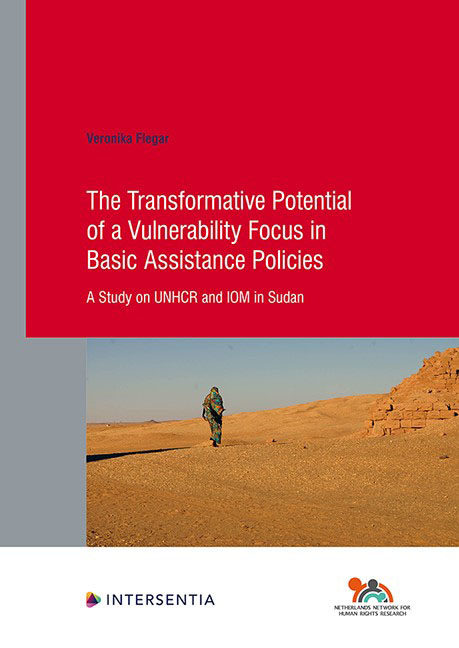 The Transformative Potential of a Vulnerability Focus in Basic Assistance Policies
The Transformative Potential of a Vulnerability Focus in Basic Assistance Policies Book contents
- Frontmatter
- Dedication
- Preface and Acknowledgements
- Contents
- List of Abbreviations
- List of Tables
- List of Figures
- Chapter 1 Introduction
- PART I NORMATIVE AND EMPIRICAL THEORY
- PART II BACKGROUND TO THE CASE STUDIES
- PART III CASE 1: ASSESSING AND ADDRESSING VULNERABILITY AT UNHCR KHARTOUM
- PART IV CASE 2: ASSESSING AND ADDRESSING VULNERABILITY AT IOM KHARTOUM
- PART V
- Bibliography
- Samenvatting
- Summary
- About the Author
- Human Rights Research Series
Chapter 2 - Normative Theory
Published online by Cambridge University Press: 11 November 2021
- Frontmatter
- Dedication
- Preface and Acknowledgements
- Contents
- List of Abbreviations
- List of Tables
- List of Figures
- Chapter 1 Introduction
- PART I NORMATIVE AND EMPIRICAL THEORY
- PART II BACKGROUND TO THE CASE STUDIES
- PART III CASE 1: ASSESSING AND ADDRESSING VULNERABILITY AT UNHCR KHARTOUM
- PART IV CASE 2: ASSESSING AND ADDRESSING VULNERABILITY AT IOM KHARTOUM
- PART V
- Bibliography
- Samenvatting
- Summary
- About the Author
- Human Rights Research Series
Summary
This chapter elaborates upon the study's normative position. The arguments presented in this chapter are normative assumptions that form the starting points of this study. Hence, they are not challenged or tested in this study but form the evaluation framework for reflecting upon the transformative potential of a vulnerability focus in basic assistance policies.
The chapter starts by explaining the limits of the universal human rights ideal when it comes to non-citizens (2.1). The chapter then conceptualises the two dimensions of the vulnerability notion's transformative potential for substantive equality on which this study focuses: the potential for mitigating stigmatisation and stereotyping (2.2.1) and for facilitating socio-economic participation (2.2.2). Subsequently, the chapter outlines how these two dimensions of the vulnerability notion's transformative potential are operationalised in the two case studies (2.3). The chapter ends with some concluding remarks (2.4).
THE LIMITS OF THE UNIVERSAL HUMAN RIGHTS IDEAL FOR NON-CITIZENS
The previous chapter already mentioned the ambiguous relationship between universal human rights and state sovereignty. States have effectively institutionalised this ambiguous relationship by formalising the concept of citizenship as a means of inclusion and exclusion. Any issue in the migration context therefore essentially revolves around citizenship and reveals the tension between a state's interest in protecting and controlling access to its territory and resources and the individual noncitizen's interest in being granted access, protection and assistance.
Citizenship allows states to distinguish persons entitled to all rights from persons whose rights may be more limited. Bosniak suggests that – at least in theory – citizenship therefore entails both “universalist and exclusionary commitments”. Citizenship is largely universal on the inside of a political community as all citizens are considered equal and entitled to the full protection of their rights. Simultaneously, it is exclusive on the outside of the same political community as noncitizens are usually excluded to varying degrees and have to fulfil certain criteria in order to gain (partial) access to these rights. The universalist commitments consequently only apply on the inside, whereas exclusion dominates the outside of the political community. Bosniak asserts that this system, achieved through the construction of citizenship, can only be maintained for as long as there truly exists a separation between the inside and outside.
- Type
- Chapter
- Information
- The Transformative Potential of a Vulnerability Focus in Basic Assistance PoliciesA Study on UNHCR and IOM in Sudan, pp. 27 - 44Publisher: IntersentiaPrint publication year: 2020
